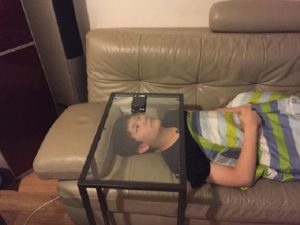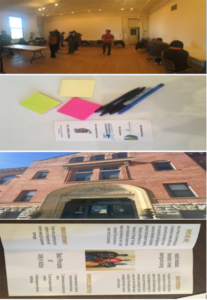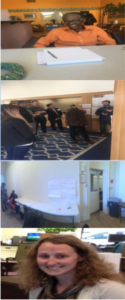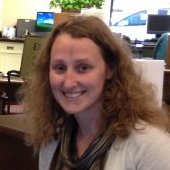Author: Stephen
Final Report- Business Model Canvas
Ethnography- Interactive collage
Ethnography- Individual 2
Ethnography Summary
Stephen Muldoon interviewed client of AIDS Ministries
Date: 3/7/17
Type: Interview
Location: LaFun
Team participants: Conducted interview over phone with group
User Characteristics:
Previously incarcerated individual with AIDS
Male, 20-30’s
Optimistic and in good spirits; young and vibrant
What is this person’s biggest point of pain? Similar to the other individual, this man currently facing trouble finding a job and housing due to previous history. Medication for his AIDS is not supported by the government past prison and AIDS Ministries can only support past 2 months; he is also on house arrest. However, this younger man has the support of his family and thus has a place to stay with financial support.
Memorable quote from interview: “My family definitely helps, if I didn’t have them I would be homeless or probably dead. Staying clean is my main focus at the moment.”
Top 3 Learnings:
- Most of the people stricken with AIDS within the community get it from dirty needles
- No consistent help from outside; family a necessity
- Economic backgrounds of these individuals is a decisive factor between life and death
Key Insight – (1) Individual not really concerned with the future (2) Having the family completely changed the man’s outlook on his on life (3) Might not understand the gravity of his situation yet, in particular with the AIDS virus
Ethnography- Individual interview 1
Ethnography Summary
Stephen Muldoon interviewed client of AIDS Ministries
Date: 3/7/17
Type: Interview
Location: Lafun
Team participants: Conducted interview over phone with group
User Characteristics:
Previously incarcerated individual with AIDS
Male, 30-40’s
Very sullen and depressed individual
What is this person’s biggest point of pain? Currently facing trouble finding a job and housing due to previous history. Medication for his AIDS is not supported by the government past prison and AIDS Ministries can only support past 2 months. He struggles most with what he is going to do wit his life.
Memorable quote from interview: “I’ve been stigmatized my whole life. It is what it is man. But with it [criminal record], I can’t get no job or no place to live. I feel like I have to live my life alone.”
Top 3 Learnings:
- Aids ministries and organizations alike only can provide medication and housing for a limited time; there are no permanent solutions.
- Different crimes can change the degree of which these people may live their lives
- The cause of the vicious cycle stems from the difficulty these people face with trying to leave it
Key Insight – (1) A support system can make it or break peoples lives that are afflicted by this disease and background (2) There is almost a systematic discrimination against these people to try and live better lives (3) There is almost an incentive to go back to prison as so much is taken away from these people
Ethnography- Analogous Immersion
With the direct immersion experience dealing with the actual struggles faced by the individuals of whom our project is directed towards, this analogous immersion serves as a parallel to the similar struggles faced but with more relevance to peers. As explained in the immersion work, individuals are faced with the hardships of not being able to achieve certain things that may better their lives. Something analogous to this might be the school experience. Many children start school but many with different backgrounds. To parallel the situation of the individuals for our project, let us assume that we can experience the struggles of a child from a poor background in a public school.
No matter how hard the effort put in is, classwork may still and the teachers aren’t necessarily of the highest caliber to help me achieve. As a result, school might not be the biggest focal point, especially with the economic struggles of the family. As a result, activities that are easy to make quick cash might be an option to help out the family to even eat, as the direct benefits of school are hard to quantify or even see at this point. This could happen to many good kids, as they aren’t given many options to achieve highly if it is not in sports. So, selling drugs might be the quickest and easiest option to help out.
The school or police might find out and catch me. Being a child of low economic backgrounds, the penalty would be high. Expulsion from school might be a real threat and criminal charges might also be brought to the table. With this, how can one achieve? It’s not like selling drugs is where a kid like this wanted to start doing, but there aren’t many other routes or options. As a result, any goal to go to college is thrashed and even getting a job might prove very difficult. It is this cycle that can be closely mirrored to what is happening to the individuals that our project strives to help: dealing with hardships leading to dangerous options that are hard to arise from due to the economic standing.
Ethnography- Immersion
With the nature of our project, it would be very difficult to imagine the actual struggles that previously incarcerated individuals with AIDS through on a day to day basis. However, with the interviews and insights I was able to gain from professionals working with those individuals and the actual individuals themselves.
Growing up, the society in which I would live would tend not to be the best and most economically strong place. After a negative upbringing, drug use and crime tends to be imminent. After possession and use, Incarceration would be a given for possibly up to many years. Family would disappear and friends would fade, as this struggle of life would be dealt with.
Coming out of prison, there is ultimately nowhere to stay. There is no family, no friends (who have such a place to stay). There is no guaranteed medicine anymore as that was only in prison and there is a criminal record looming. Employers say no when jobs are sought after and landlords can’t provide housing because there is no collateral and no fixed cash flow incomes.
With this in mind, what even are the options for help? AIDS ministries only provide medicine for a certain period of time and temporary housing and Imani Unidad only provides group meeting and counseling. What is needed is a change in lifestyle that can only be accomplished by getting a job and housing. Without, the viscous cycle of committing the same crimes and spirilling back to prison is almost a guarantee, if not sought after completely (permanent housing, medical care, food).
This, as explained to me, is really the immersion experience that these individuals go through. Our project seeks to highlight these individuals and try to bring about a product that can be implemented so that these people may become their own best self-advocates. A change that can fight the systematic discrimination brought on by people who are actually trying to bring about a meaningful difference to their life and for the better.
Gallery Day Reflection
Gallery day was a great experience for me as I’m sure it was for the whole team. We presented all of the work we had culminated up to that point utilizing charming posters with insights coupled with roadmaps and a deep learning for what we were trying to accomplish. I had not yet met Debra, the head of Imani Unidad itself, so presenting her with our project was somewhat nerve-wracking but it turned out very well for us. Debra brought two of her associates from Imani Unidad and they loved the attention we brought to the organization and the highlights of issues needing to be addressed. Both parties agreed that the firm needed a stronger marketing PR of bringing in members in to the organization. The activity ended with some parting thoughts of making sure we continue to interview employers and realtors on their insights for further insight in our ethnographic research. It was an enjoyable day and very eye opening to get thoughts on the actual people dealing with these issues.
Leaah Hopper, Expert Interview
Ethnography Summary
Stephen Muldoon interviewed Leaah Hopper of AIDS Ministries
Date: 3/3/17
Location: Library
Team participants: Conducted interview in group
User Characteristics: “Passionate Worker”
Executive Program Leader for AIDS Leader
Female, 30-40’s
Full-time employee and social worker for AIDS stricken Individual
Driven to support under served demographics affected by certain situations
What is this person’s biggest point of pain? Dealing with difficulties and shortcomings of individuals that do not stay on right track of help provided by organization. Dealing with heartbreaking outcomes for people affected by the disease.
Memorable quote from interview: “In some Counties, when incarcerated, they [Convicts] have a job- they have a purpose. When they get out, they are looked at with different eyes and made to believe they have no purpose “
Top 3 Leanings:
- Over eleven thousand people affected in South Bend by HIV. 78% of those live under the poverty line. The AIDS Ministry serves 416 of them. Over 40% still using drugs.
- Sex offenders really being affected as they can only really live in outskirts of society; future of the individuals affected by criminal past really dependent on crime
- AIDS Ministry provides housing to anyone with HIV that needs it; permanent solutions for individuals and families- also provide medicines.
Key Insight – (1) South Bend really underserved relatively to large HIV inflicted population (2) No real benefit from leaving jail as getting a job and a sustainable living space is almost impossible; also no help with medical coverage for disease past prison. (3) State of Indiana does not help or have any programs aimed at helping drug affected individuals; no real support system that is superior with resources.
Activities:
- Manages AIDS Ministries as a senior leader
- Helps AIDS stricken individuals with housing, medication, and rehab support
- Leads AA type meetings to provide support systems for those afflicted
- Works with Government to create initiatives for affected individuals and to help them with medication and preventing future abusive
- Provides families with permanent housing
- Provides temporary housing for anyone with any type of background (with AIDS) and helps in seeking profession and full time housing
Environment
- AIDS Ministries organization
- Environment inclusive of people with AIDS disease
- People, usually ex-convicts, make up large portion of members
- Other senior leaders and administrative assistants involved
Interactions:
- Talking with and helping members seeking to better themselves
- Work personably with people on what the necessary steps are to improve life
- Noted how passionate she spoke to us about the difficulties of these individuals and how there has to be more done to help them
Objects:
- Office desk, sitting on a chair
- Writing on notepad with pen
- Had small child at her side
Users:
- Leaah Hopper
- Me and the team
- Members of the organization
Workarounds



previously printed and brought to class on date due



